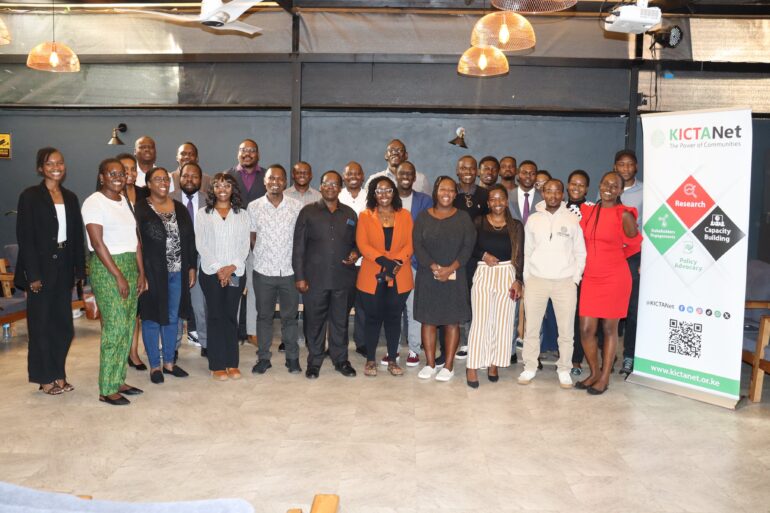On April 15, 2025, together with our partners, the Kenya ICT Action Network (KICTANet) and the International Commission of Jurists (ICJ Kenya), we convened a stakeholders’ meeting at the Maguezi Hub to forge the way forward on the state of digital rights in kenya.
The meeting brought together a diverse coalition of civil society representatives, media professionals, legal experts, content creators, and digital rights advocates, a continuation of ongoing efforts to deal with the constantly evolving challenges that define the digital rights sphere in Kenya.
Kenya’s digital space is experiencing unprecedented growth, unlocking remarkable opportunities for innovation, communication, and enhanced civic engagement. However, this rapid expansion has also ushered in a new wave of threats, ranging from surveillance and censorship to the disruptive impact of internet shutdowns and the constraints imposed by restrictive legislation. Against this backdrop, the meeting served as a crucial point to provide a platform to reflect on the progress made in digital rights advocacy, assess the emerging threats critically, and collectively forge a unified roadmap for future action.
The discussions at the meeting were centered around several key focus areas deemed critical to advancing digital rights in Kenya. Participants underscored the fundamental need for a comprehensive mapping of the stakeholders actively involved in the digital rights ecosystem, encompassing both local and global actors shaping areas such as artificial intelligence governance, content moderation practices, cybersecurity protocols, and the overarching framework of internet regulation.
The conveners also recognized that legal instruments alone are insufficient to guarantee digital rights, the conversation emphasized the importance of a multi-pronged approach that integrates robust legal advocacy with strategic public awareness campaigns, the mobilization of grassroots movements, and the fostering of innovative solutions.
Speaking during the event, ICJ Kenya Deputy Executive Director Demas Kiprono said, ” The accelerating digitization of our society profoundly reshapes fundamental rights from how we express ourselves and access information to our privacy and economic prospects online. Understanding this complex digital terrain and enhancing digital literacy are not just important; they are essential cornerstones in promoting access to justice in this new era.”
A significant aspect of the deliberations revolved around the necessity of proactive engagement with the judicial and prosecutorial arms of the government. Participants highlighted the critical role of training judges and actively collaborating with the Director of Public Prosecutions (DPP) to ensure informed and just rulings in cases pertaining to digital rights violations. Furthermore, the meeting explored alternative advocacy pathways, acknowledging that dialogue with policymakers and strategically leveraging political, social, and economic influence can serve as powerful complements to traditional litigation efforts.
Recognizing the foundational importance of an informed citizenry, the discussions also heavily emphasized the need for robust digital literacy and empowerment initiatives, equipping citizens with the knowledge to understand their digital rights, identify misinformation, navigate the complexities of online surveillance, and ensure their online safety.
Several key recommendations were also shared to promote digital rights in Kenya. These included the urgent launch of widespread digital rights awareness campaigns to educate the broader public, the provision of comprehensive digital safety and privacy training to empower individuals, and the proactive promotion of digital inclusion in marginalized areas to bridge the digital divide.
Participants also stressed the importance of strengthening collaborative ties among civil society organizations, technology experts, and media outlets to create a more unified and impactful advocacy front. The need to engage international partners to amplify advocacy efforts on a global scale was also highlighted. The meeting also explored the potential of leveraging alternative technologies as a means to bypass censorship and evade internet shutdowns, ensuring the continued flow of information and communication.
The stakeholders reached a consensus on the strategic direction for future digital rights advocacy. This includes a conscious effort to reduce overreliance on protracted legal battles, to foster greater regional collaboration on digital rights issues, and to significantly strengthen the internal capacities of organizations working in this critical space. And finally, the valuable insights gleaned from the meeting will serve as a guiding compass for BAKE’s future advocacy initiatives, public campaigns, and strategic partnerships, all to ensure a secure and open internet for all Kenyans.
